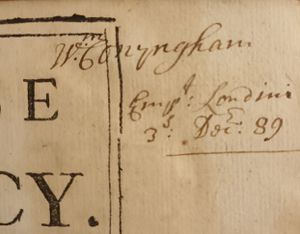Difference between revisions of "William Conyngham d.1721"
| Line 4: | Line 4: | ||
====Biographical Note==== | ====Biographical Note==== | ||
| − | William Conyngham (Good-Will) (d.1721) was the son of William Conyngham (d.1666), one of Oliver Cromwell’s Commissioners in County Armagh during and after the 1641 rebellion. Descended from Scots Presbyterians (probably from Ayrshire), who settled in Ulster during the reign of James I, Conyngham senior established the family in [[location::Ballydrum]] by purchasing land. In the early seventeenth-century, land in the area had been seized from the O’Neills, O’Cahans, and O’Mullans. The Ballydrum townland in [[location::County Londonderry]] is where Good-Will built [[location::Springhill]] House, approximately a mile from the Draper’s Company Plantation town of [[location::Moneymore]]. | + | William Conyngham (Good-Will) (d.1721) was the son of William Conyngham (d.1666), one of Oliver Cromwell’s Commissioners in County Armagh during and after the 1641 rebellion. Descended from Scots Presbyterians (probably from Ayrshire), who settled in Ulster during the reign of James I, Conyngham senior established the family in [[location::Ballydrum]] by purchasing land. In the early seventeenth-century, land in the area had been seized from the O’Neills, O’Cahans, and O’Mullans. The Ballydrum townland in [[location::County Londonderry]] is where Good-Will built [[location::Springhill]] House, approximately a mile from the Draper’s Company Plantation town of [[location::Moneymore]]. Good-Will inherited estates in the Counties of Derry, Tyrone, Armagh and Antrim. |
| − | Good-Will was a [[occupation::Captain]] in a regiment of Dragoons; | + | Good-Will was a [[occupation::Captain]] in a regiment of Dragoons; his commission was signed in 1688/9 by William of Orange. In 1680, Good-Will had married [[family::Anne Upton]] (n.d.) of Castle Upton in County Antrim. In 1688/9, Good-Will, receiving intelligence of the imminent Irish uprising, sent Anne to Derry. Both were then caught up in the 1689 Siege of Derry. Records suggest that William Conyngham, amongst other Conynghams, were important participants in the defence of the city. It is thought that Good-Will was one of a party of delegates sent to London to negotiate compensation for the financial hardship caused by the siege. After the Williamite War, Good-Will held the post of [[occupation::Overseer of the Woods and Forests of Ulster]] for the [[organisations::Irish Society]]. He died in 1721 and was buried in [[location::Lissan Churchyard]]. |
====Books==== | ====Books==== | ||
| Line 18: | Line 18: | ||
<div id="sourcelist"> | <div id="sourcelist"> | ||
*Lenox-Conyngham, Mina, ''Springhill: An Old Ulster House and the People Who Lived in It'', Belfast, 2005, 7-24. | *Lenox-Conyngham, Mina, ''Springhill: An Old Ulster House and the People Who Lived in It'', Belfast, 2005, 7-24. | ||
| + | *Lenox-Conyngham Papers, Public Records Office Northern Ireland D1449. | ||
*Purcell, Mark, ''The Big House Library in Ireland'', Swindon, 2011, 40-52. | *Purcell, Mark, ''The Big House Library in Ireland'', Swindon, 2011, 40-52. | ||
Latest revision as of 04:27, 4 January 2023
William CONYNGHAM, d.1721
Biographical Note
William Conyngham (Good-Will) (d.1721) was the son of William Conyngham (d.1666), one of Oliver Cromwell’s Commissioners in County Armagh during and after the 1641 rebellion. Descended from Scots Presbyterians (probably from Ayrshire), who settled in Ulster during the reign of James I, Conyngham senior established the family in Ballydrum by purchasing land. In the early seventeenth-century, land in the area had been seized from the O’Neills, O’Cahans, and O’Mullans. The Ballydrum townland in County Londonderry is where Good-Will built Springhill House, approximately a mile from the Draper’s Company Plantation town of Moneymore. Good-Will inherited estates in the Counties of Derry, Tyrone, Armagh and Antrim.
Good-Will was a Captain in a regiment of Dragoons; his commission was signed in 1688/9 by William of Orange. In 1680, Good-Will had married Anne Upton (n.d.) of Castle Upton in County Antrim. In 1688/9, Good-Will, receiving intelligence of the imminent Irish uprising, sent Anne to Derry. Both were then caught up in the 1689 Siege of Derry. Records suggest that William Conyngham, amongst other Conynghams, were important participants in the defence of the city. It is thought that Good-Will was one of a party of delegates sent to London to negotiate compensation for the financial hardship caused by the siege. After the Williamite War, Good-Will held the post of Overseer of the Woods and Forests of Ulster for the Irish Society. He died in 1721 and was buried in Lissan Churchyard.
Books
The extent and disposition of Good-Will’s library are not known. There are c.10 books that may be connected to Good-Will in the library at the National Trust’s Springhill. These include works of theology by dissenting divines, practical works of law, and works on the politics and government of Ireland. It is feasible that other works of dissenting theology at Springhill, bought around the time of the Williamite War, may also have belonged to Good-Will.
Characteristic Markings
Good-Will inscribed his books ‘Wm. Conyngham’ on the title page, where he might also record the place and date of purchase. Several of Good-Will’s books feature white paper spine labels; other unsigned books bearing these labels are present in the library at Springhill.
Sources
- Lenox-Conyngham, Mina, Springhill: An Old Ulster House and the People Who Lived in It, Belfast, 2005, 7-24.
- Lenox-Conyngham Papers, Public Records Office Northern Ireland D1449.
- Purcell, Mark, The Big House Library in Ireland, Swindon, 2011, 40-52.
